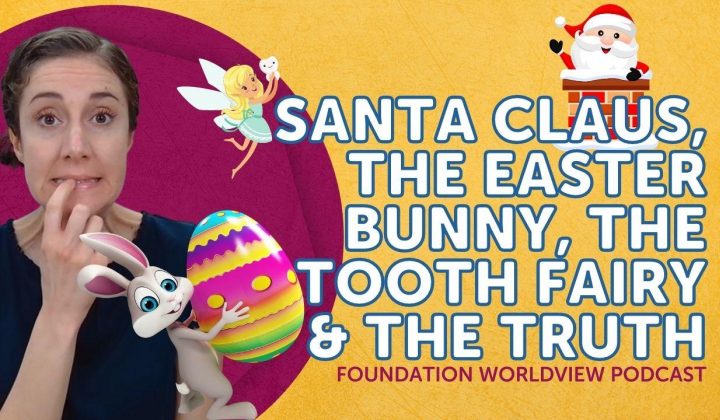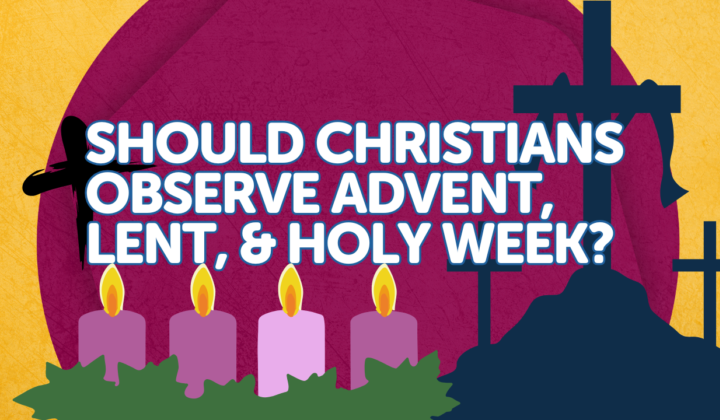Learn more about the journey that led to us equipping kids to carefully evaluate every idea they encounter.
Meet members of our team who have contributed to curriculum development.
Hear from real users of the Foundation Curriculum.
Learn what we believe about God, Jesus, Scripture, and more.
Is Christmas Really a Pagan Holiday?
Is Christmas a pagan holiday? Should Christians celebrate it? In this episode, Elizabeth Urbanowicz tackles a question many have wrestled with: the origins of Christmas and whether its traditions align with a biblical worldview. Learn how to critically and biblically evaluate holiday practices with your children and how to redeem these traditions to point hearts toward the beauty of the incarnation.
Transcript
Note: The following is an auto-transcript of the podcast recording.
Hello, friends. Today's podcast question says, "I have some acquaintances who believe that Christmas is a pagan holiday and we shouldn't be celebrating it. Can you speak to that?" Yes. I would love to speak to this question because this is one I actually wrestled through when I was in college that I had some friends in college that just very staunchly insisted that we should not be celebrating Christian because of its pagan origins. And so I spent a good deal of time thinking through this and have over the years, and so I'm excited to talk about Christmas, its origins and what we should do with this. And I'm answering this question today on the Foundation Worldview podcast because I think this is a great question for us to think through with our children, specifically our children, ages eight and older, to get them thinking critically and biblically about what we do for different holidays celebrated in our culture.
So that's the question we're going to dive down deep into today on the Foundation Worldview Podcast where we seek to answer your questions so that you can equip the children that God has placed in your care to carefully evaluate every idea they encounter and understand the truth of the biblical worldview. I'm your host, Elizabeth Urbanowicz, and I'm thrilled that you've joined me for this episode today. And before we dive down into answering this question, I just wanted to say a quick thank you to several of you who recently on Apple Podcasts have not only taken the time to rate this content but have taken the time to write a review. It is not at all expected that you would write a review of this content, but as someone who sits behind a camera at my desk answering questions, I usually don't get to see the impact that the podcast has, but it's just been such an encouragement to me to read some of those comments and just to hear how the Lord has used this content in your lives and in the lives of your children. So for those of you who have invested that time, just know that that has been such an encouragement to me and to other members of our team, and we just really appreciate the fact that you would invest the time to do that because that's not necessary, but just know that it is so greatly appreciated.
Well, we're going to be thinking about why do we celebrate Christmas and should we be celebrating Christmas? So if we're talking through this with our children, I think the first question that we should explore is "Why do we celebrate Christmas?", so we can ask our kids this and we can just talk through it. And I think that the answer to this question, why we celebrate Christmas, Christmas while this Christmas story is outlined in the Bible, we are not specifically given a command. Thou shalt celebrate Christmas in Scripture. But why is it that we do this? I think the answer is that Christmas time is a time to focus our hearts and our minds on the incarnation, as John one verse 14 puts it, the fact that "the word became flesh and dwelt among us." Our lives are so busy and harried and hurried and the world around us and even our own sinful nature is always seeking to conform us to the patterns of this world. Where the Christmas season is a time where we've actually set aside specific month to focus on what God has done to rescue us, that Jesus came in the flesh. So why do we celebrate Christmas? Because it's a time to reflect on God's goodness in sending Jesus, and it's a time for praising God, for choosing to rescue us from our sins.
So then the next question I think we can ask ourselves and our children is, "Is it good to do this? Is it good to set aside specific time to focus our hearts and our minds on the incarnation?" Well, I hope that the answer to this question is very obvious, that it's a resounding yes in our fallen state. It is good and beautiful and healthy for us to have this yearly time to set aside other things and to focus on God's grace in sending Jesus. So as we look at these questions, why we celebrate Christmas? And then is it good that we celebrate Christmas? I hope that becomes clear. Okay, we celebrate Christmas to focus our hearts and minds on the incarnation. It's good for us to do this in our fallen state.
And then the next question we should look at specifically as this questioner has asked is, "Are certain holiday traditions pagan?" Now, I have in my own research, I've read lots of different articles online and have heard different things in my research that some people argue that December 25th was a day when different pagan gods were worshiped. That certain of our traditions such as Christmas trees and gift giving and other things were pagan traditions. So are certain traditions on Christmas pagan? Well, it's possible. It is possible. There's some evidence out there saying that some of these traditions do have pagan roots.
Well, then the next question is, does this mean that these traditions that we incorporate into our family life, does this mean that they're not honoring to God? So that's a really good question, the one for us to think through with our children. So we're going to take a minute to think about this. Now, think about a Christmas tree. Normally we bring a tree into our house, whether it's a real tree or an artificial tree, and we usually put lights around it and ornaments. Now, if a Christmas tree, if bringing a tree into your house and putting candles on it, lighting it up was originally used in some form of pagan worship, does that mean that we are worshiping a pagan God by bringing a tree into our homes? Well, no. There are many things in our lives that initially had pagan origins, but we are not using them as the pagans would. For example, naan bred. I'm sure many of you have eaten naan breaded. It's frequently featured in different Indian and other Asian dishes and naan breaded originated in the Middle East and it was used in pagan worship. Does that mean every time that I make curry and I buy some naan bread, I am worshiping a pagan deity from the ancient near East? No, I am just eating a form of bread that I enjoy.
I think we see this similarly when Paul is talking about whether or not Christians in the first century could eat meat sacrifice to idols. You know that the Christians weren't supposed to go around and ask was the sacrifice to idols? Was the sacrifice to idols? Because if it was sacrifice to idols and they knew it and they were focusing on it, then that could be a matter of conscience. But he said, when you go to the marketplace, go to the marketplace, don't ask, and you're free to buy whatever meat is sold there. And so I think it's similar with us in our traditions at Christmas. What are we doing as we bring a Christmas tree into our home? Are we worshiping a pagan God? No. What we're doing is we are symbolizing in our home that Jesus is the light of the world, that that's what that lit up Christmas tree reminds us of that in this dark world, Jesus entered into it as the light of the world.
Now, it's important that we actually talk about these things with our children, that we don't just put up a Christmas tree and never say anything about it and just say, oh, it's a tradition, but that we're reminding ourselves and our children, this is why we light up this tree because we are reminded that the world was plagued and is plagued with sin and darkness. But the word became flesh. Jesus incarnated and he dwelt among us, and he is the light of the world. And so it's like this with any part of Christmas that may have initially originated with a pagan part of the holiday. Just because we are bringing a certain tradition in our home doesn't mean that we are there for engaging in worship of a pagan God. There is an example of how we can use the things of the world for God's glory that I really love. And it stems from Augustine and his work called On Christian doctrine. And so in On Christian doctrine, Augustine, he quotes from Exodus chapter three, verse 22, which that verse reads, "but each woman shall ask of her neighbor, and any woman who lives in her house, for silver and gold jewelry, and for clothing. You shall put them on your sons and on your daughters. So you shall plunder the Egyptians." This verse is when God is instructing Moses of how he's going to go back to Pharaoh, he's going to tell him to let his people go. And eventually after Pharaoh's heart is hardened, after God hardens Pharaoh's heart and shows his signs and wonders, he's going to lead his people out of slavery. And so in this verse, God is telling Moses, not only are you going to be let go, but you're going to ask your neighbors for silver and gold jewelry and you're going to put it on your sons and daughters and you're going to plunder the Egyptians. And in his work on Christian doctrine, Augustine uses this phrase plundering the Egyptians to describe taking things of the world and redeeming them for God's kingdom. And so that's what I think we can view in any of these Christmas traditions that may originally have had pagan origins. For example, if a Christmas tree genuinely had pagan origins as Christians, we can redeem it by just what I mentioned before, that we can teach our children that Jesus is the light of the world. And every time we light up that tree, we are reminding ourselves of that truth. We are therefore plundering the Egyptians. We are taking something that was originally meant for evil and redeeming it for the kingdom of God.
Another example would be if someone claims that gift giving on December 25th was a pagan tradition in worship of pagan gods, let's redeem it by teaching our children that each and every gift that we give and that we receive ultimately points us to the only gift of lasting value, the gift of God's son Jesus. So that when we're giving gifts, which may or may not be a pagan tradition, we're actually plundering the Egyptians. We are redeeming that tradition by allowing it to point our hearts and minds back to the only gift of lasting value.
So I hope that that's a phrase that you'll take with you as you just think through all of the different Christmas traditions that we have. Let's plunder the Egyptians this Christmas season by using every opportunity with everything that we do during the holiday season to point our children back towards the beauty of the incarnation. So that would be my short explanation of should we actually celebrate Christmas, how we celebrate Christmas, whether or not we choose to engage in gift giving, whether or not we choose to have a Christmas tree, whether or not we choose to bake cookies and go caroling. Those are all going to be individual decisions for individual families. However, the fact that we have a month where we can take a step back from the busyness of normal life and focus our hearts and our minds on the fact that the word became flesh and dwelt among us is something that is so good. It is true. It is beautiful, and I think that every Christian should engage in setting the month of December to focus our hearts and our minds on the incarnation.
Now, if you are watching this podcast on YouTube and you have some family Christmas traditions that you have instilled in your family really to point you and your children to the beauty of the incarnation, would you just take a moment to share those? I think that when we hear from others different traditions, it can really help us in our own homes just get ideas of what are some more things that we can do to point us and our children back towards the beauty of the incarnation? Well, that's a wrap for this episode. But if you have a question that you would like for me to answer on a future Foundation Worldview podcast, you could submit that question by going to FoundationWorldview.com/podcast. As we leave this time together, my prayer for you, it's the same as always, that no matter the situation in which you and the children God is placed in your care, find yourselves that you would trust that God is working all things together for your good. By using all things to conform you more into the image of His Son. I'll see you next time.
Related Posts and insights

Santa Claus, The Easter Bunny, The Tooth Fairy, and the Truth
If we are teaching our children about objective truth, evaluating claims and understanding that the biblical worldview is true, is it harmful or antithetical if we're encouraging belief in Santa Claus or the Easter Bunny or the Tooth Fairy?

Should Christians Observe Advent, Lent, and Holy Week?
Is observing Advent, Lent, or Holy Week appropriate for evangelical Christians? In this episode, Elizabeth Urbanowicz explores whether following the church calendar aligns with a biblical worldview. She provides practical suggestions for incorporating these traditions into family life to help focus children's hearts and minds on the gospel. Whether you're familiar with these rhythms or curious about their benefits, join us for a thoughtful discussion that equips parents to lead their families in intentional discipleship.

Christian Perspectives on Halloween: Participation, Principles, and Conscience
In this episode of the Foundation Worldview podcast, host Elizabeth Urbanowicz tackles a timely and controversial topic: Halloween. Drawing from biblical principles and the spectrum of Christian perspectives, Elizabeth dives deep into how Christians might approach the holiday. Through three discerning categories - what the Bible explicitly condemns or commands, issues not directly addressed but influenced by biblical principles, and matters of personal conscience - she gives a balanced view on Halloween participation. Whether you're a parent grappling with the decision to let your child trick-or-treat or simply seeking to understand this age-old debate better, this episode is for you. Dive in to explore the intersection of faith and festivities!




